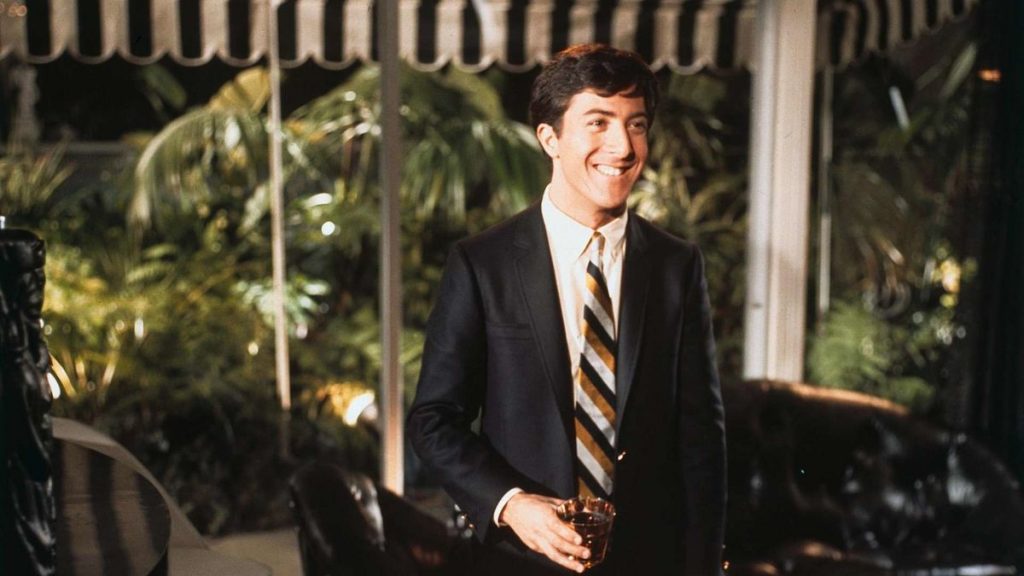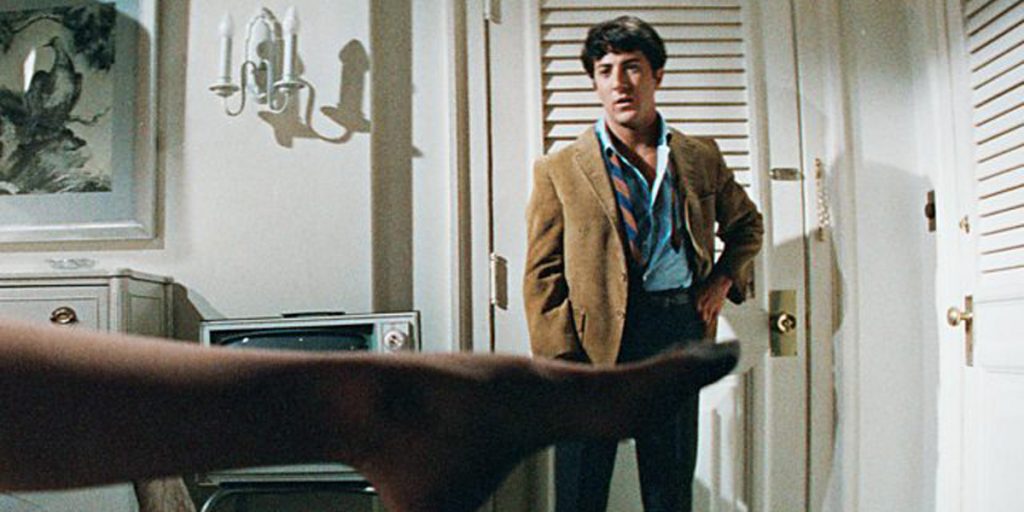Now as iconic as any great of the 1960s, The Graduate remains, by far, the most joyful treatise on the divide between the American young and old.
We first see Benjamin Braddock (Dustin Hoffman, in his first truly star-making role) in transit; this title figure of The Graduate has just completed his studies at a prestigious, unnamed eastern American university and is returning home to California with a string of accolades and qualifications to his name. Immediately, he is set upon by a crowd gathered by his oppressively doting parents, a gaggle of family friends throwing myriad career prospects and titbits of wisdom in his face, clamouring to the point of claustrophobia. When Ben finally manages to escape this throng and cloister himself in his bedroom, he encounters the all-too-assured and never-fully-named Mrs Robinson (Anne Bancroft), a married family friend who swiftly cajoles him into giving her a ride home. This is where Ben’s life takes its first unforeseen turn – the beginning of a tumultuous and disastrous love affair that throws the generational divide in the 1960s into sharp focus.
There’s a sense of a very European kind of malaise throughout The Graduate, as if director Mike Nichols had transplanted a Truffaut romance into the heart of the American upper-middle class. Ben possesses that Bohemian kind of ennui, despite having absolutely no semblance of a Bohemian lifestyle – it is only when his affair with Mrs Robinson becomes his all-consuming direction in life that a previously prescribed course of direction for his career and personal life begins to fall apart. The impact of the height of the 1960s college counterculture is unavoidable here, as Ben’s family represents one of the surest cinematic examples of the culture that needs countering: white, wealthy, oppressively ‘comfortable’ and pressuring Ben to carve out the same good fortune as they had done. It’s not until the entirely self-motivated intervention of Mrs Robinson that Ben stops being a passive participant in his own life, and the destructiveness of that decision haunts the rest of the film.
Hoffman is, clearly, the star of the show here, and it’s a role he shoulders with a maturity unbecoming of a star in their first ever leading role. Hoffman has repeatedly given a large part of credit for his career as a whole to Nichols, who took a huge risk bringing on an unknown actor for what became, by far, the most commercially successful film of his directorial lifetime; however, it’s fairly clear what Nichols must have seen in Hoffman, too. Hoffman embodies this figure who knows exactly what he is supposed to say in any situation, but almost seems two seconds too slow to get it out; he has at the very least a conscious knowledge of his own self-worth, but needs to remind himself of these facts constantly and deliberately in any given social situation. It is by no accident that a generation of young American men saw themselves in Hoffman’s performance, and it is a masterful turn that makes Ben just about unlikeable enough to force them into introspection.

This performance is delightfully counterbalanced by both of the generations of Robinson women that Ben becomes entangled with, as well as by the adult figures omnipresent in Ben’s life. Anne Bancroft somehow manages to embody an almost otherworldly force of nature, despite only being 35 years old when the film was produced, and manages to make sudden lurches between despicable antagonist and relatable, tragic figure seem justified and natural. She plays one of several adult characters who have a veneer of inaccessibility, as if they exist in an entirely separate realm of consciousness to Ben, and it seems as though Mrs Robinson is the only one capable of breaking through that façade. Mrs Robinson’s daughter Elaine (Katharine Ross), however, seems to simultaneously exist within and without Ben’s world, and their mutual infatuation seems to be almost entirely constructed upon a fundamental and untested compatibility – this uneasiness and lack of certainty in their blossoming relationship, as Hoffman and Ross deliver it, is what drives the movie, seemingly inescapably, towards its climax.
All this is to ignore a rather large aspect of the film: it is incredibly funny. Calder Willingham and Buck Henry’s script has become so iconic as to have become clichéd in the years since release, and with good reason as quotes and scenes have become embedded in popular culture, parodied by everybody from The Simpsons to Bustedto Reeves and Mortimer’s Renault adverts. Similarly, its visual comedy feels remarkably fresh and progressive for a film of the 1960s, and one can draw a clear thread of influence between Robert Surtees’ camerawork and the films of John Hughes two decades later. Paul Simon’s soundtrack has also taken on a life of its own outside of the film, with the song “Mrs Robinson” rivalling the movie for modern-day popularity, and so hearing such an early version of the song as part of the movie’s soundtrack is perhaps a little thrilling – even if hearing “Scarborough Fair” for the fourth time in seven minutes can begin to grate.
Of course, when discussing a film such as The Graduate the question of its aging should be brought to the forefront. There’s little that has become overly controversial about the film since its release, but a few critics such as Roger Ebert who raved about the film contemporaneously soured on it a little as both they and the movie itself aged. There is widespread consensus that it is Mrs Robinson, not Ben, who becomes the sympathetic touchstone of the movie to an older viewer, as one finds themselves drawn across to the other side of the generational divide, at which point Ben’s attempts to dislodge himself from his pre-defined place in an adult world make him into more of a snivelling, weaselly character than can be easily determined by a twenty-something viewer. To me, this simply marks the film as an even greater success; as we enter a period of increased worldwide generational divide, and younger generations appear to be the first in decades in the west to be financially worse off than their parents, a film such as The Graduate that plays to both sides of this conflict remains blissfully resonant, and more than a joy to revisit.
The Graduate was released on December 21, 1967, and is now available to watch on digital, on demand, and on DVD & Blu-Ray.

